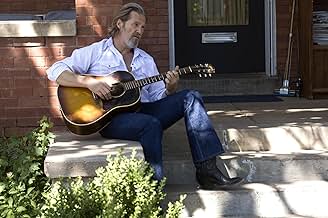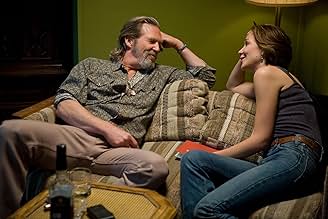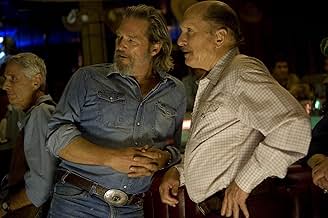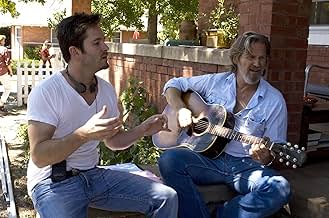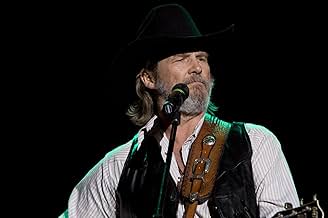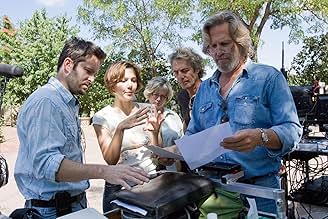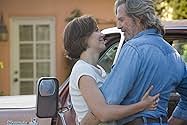Un musicista di musica country è costretto a rivalutare la sua vita disfunzionale.Un musicista di musica country è costretto a rivalutare la sua vita disfunzionale.Un musicista di musica country è costretto a rivalutare la sua vita disfunzionale.
- Vincitore di 2 Oscar
- 40 vittorie e 33 candidature totali
Jerry Handy
- Cowboy
- (as Jerry Hardy)
J. Michael Oliva
- Bear
- (as J. Michael 'Yak' Oliva)
Jose Jacinto Marquez
- Older Hispanic Man
- (as Jose Marquez)
Recensioni in evidenza
Here is the film that the ridiculously talented Jeff Bridges finally won an Oscar for, and deservedly so. His performance is the gleaming highlight of this film in the best way possible. He is playing washed up country singer Bad Blake, trying to overcome alcoholism and a dying career. The story is very touching, and how could you expect anything less than incredible from a character study piloted by Jeff Bridges. The film has a very organized focus on Bridges' character but he is also backed by a fantastic supporting cast. Maggie Gyllenhaal plays an aspiring reporter who interviews Blake, only to fall in love with him shortly after. Her performance is equally touching and feels so real alongside Bridges. Colin Farrell plays Tommy Sweet, an old friendship of Bad Blake's that went sour somewhere along the line. And then of course there is the small yet significant role of Bad Blake's long time old fishing buddy Wayne, played by the masterful Robert Duvall. The limited number of scenes between Bridges and Duvall are some of the best and most sincere of the movie. Crazy Heart is a great film to watch in order to see fantastic actors do what they do best... act.
The character development in Crazy Heart embodies the film's strong suit, which is the wonderful acting ability of the cast. There is not a moment when you don't believe in these characters and you truly feel that they are sincere and real. It is also just so incredibly satisfying to watch legends like Bridges and Duvall act side by side in beautiful and perfectly fitting roles such as these. The story of Bad Blake itself is very interesting, but the characters are where the heart and soul of the film lay. The plot leaves something to be desired, but it doesn't fault the movie as much as it could when you have such great actors filling the roles of such articulated characters. Admittedly, the film drags a bit towards the middle and the climax of the film doesn't hit as hard as I would have liked, but it leads into a cathartic and slightly cheesy ending, which leaves you wanting more, but emotionally satisfying nonetheless.
Now, I am not a fan of country music at all, but in the context of this film I absolutely loved it. It is so beautiful and touching that it would almost be a crime to say you didn't like the music while watching its fitting place in this film. And as if I haven't praised the actors in this film enough, I have to give even more kudos to Bridges and Farrell who took voice lessons to sing their own songs in the film, and holy crap do they sound amazing. You would think Jeff Bridges had been a country singer all his life. If you're not a fan of country music I wouldn't recommend listening to the music before you see the movie. But after you see just how perfect the soundtrack fits the film you will love the music. The music makes this film all the more sincere and is one of the only contexts I will ever enjoy country music.
Crazy Heart isn't perfect, but I'm willing to go as far to say that Jeff Bridges is. I can get past the imperfections of the storyline and the slight melodramatic feel the last third of the film emanates when the film boasts a cast as good as this. This is a solid film that is a pure delight to watch. And best of all, it nabbed Jeff Bridges a long overdue Oscar win.
The character development in Crazy Heart embodies the film's strong suit, which is the wonderful acting ability of the cast. There is not a moment when you don't believe in these characters and you truly feel that they are sincere and real. It is also just so incredibly satisfying to watch legends like Bridges and Duvall act side by side in beautiful and perfectly fitting roles such as these. The story of Bad Blake itself is very interesting, but the characters are where the heart and soul of the film lay. The plot leaves something to be desired, but it doesn't fault the movie as much as it could when you have such great actors filling the roles of such articulated characters. Admittedly, the film drags a bit towards the middle and the climax of the film doesn't hit as hard as I would have liked, but it leads into a cathartic and slightly cheesy ending, which leaves you wanting more, but emotionally satisfying nonetheless.
Now, I am not a fan of country music at all, but in the context of this film I absolutely loved it. It is so beautiful and touching that it would almost be a crime to say you didn't like the music while watching its fitting place in this film. And as if I haven't praised the actors in this film enough, I have to give even more kudos to Bridges and Farrell who took voice lessons to sing their own songs in the film, and holy crap do they sound amazing. You would think Jeff Bridges had been a country singer all his life. If you're not a fan of country music I wouldn't recommend listening to the music before you see the movie. But after you see just how perfect the soundtrack fits the film you will love the music. The music makes this film all the more sincere and is one of the only contexts I will ever enjoy country music.
Crazy Heart isn't perfect, but I'm willing to go as far to say that Jeff Bridges is. I can get past the imperfections of the storyline and the slight melodramatic feel the last third of the film emanates when the film boasts a cast as good as this. This is a solid film that is a pure delight to watch. And best of all, it nabbed Jeff Bridges a long overdue Oscar win.
Saw an early screening of "Crazy Heart". "Crazy Heart" is a very good film for one reason. Many critics have praised it and will continue to do so. Many critics will write it off as "just another washed-up musician struggling to overcome their addictions and weaknesses and make sense of things", etc. In a way, they are right. In a way, this is another one of those movies. But, because of Jeff Bridges' absolutely amazing performance, this film is more than that. If you want to see an actor breathe real-life into their character, endow truthful subtlety in their part, and absolutely nail a role that they were born to play, then you need to see Jeff Bridges rendition of Bad Blake. I believed that Bridge's portrayal of "The Dude" in "The Big Lebowski" was the essential role of his career, but after seeing this performance, I've changed my tune. It's true that we will not be witnessing cinematic history with the incredible plot or awe-inspiring film-making. However, if you are a fan of acting and want to see one of those performances that comes along every once in a rare while, please check out this film.
This is a sweet and believable film about real people. The story is anything but original, and yet it is done very nicely, with kind, genuine performances and a majestic Jeff Bridges. One very good move is that the director and screenwriter put most of the exaggeration and cliches at the beginning of the movie in order for us to "get' the characters. In doing so, the movie got more interesting and realistic as it went on.
'Crazy Heart' is a simple but emotionally resonant movie about a 57-year-old alcoholic country singer whose career is on the skids. There's not much to the story, but not much is necessary with Jeff Bridges as the singer, Bad Blake; Colin Farrell as Tommy Sweet, his handsome acolyte, now a big country music star; Maggie Gyllenhaal as Jean Craddock, a small-time New Mexico journalist with a four-year-old boy who has lousy luck with men, and falls for Bad; and Robert Duvall as Wayne, the singer's clean-and-sober bartender-protector.
Bridges, Gyllenhaal and Farrell have never been better, and Duvall is always pure gold. This movie is Bridges' chance to give a master class in acting, and he does not disappoint for a minute, but he's not alone in the spotlight, and the depth of support he gets is what makes Crazy Heart worth watching.
A lifelong musician and many-talented artist (painting, photography, ceramics) whose thespian preeminence in Hollywood has yet to win him an Oscar, Jeff Bridges inhabits the songs he sings on screen as convincingly and seamlessly as he fits into the shambles of a life and mess of a body that is the film's protagonist. This musical integrity is important because Bad Blake is one of those disintegrating performers whose art has not faltered, though his life has. The songs he sings are his own, and when he's on stage, he's alive. The rest of the time he's lying, deceiving, or numbing out. A great line is when he's asked by Jean where his songs come from and he replies simply, "Life, unfortunately."
A parallel to Bridges' work in 'Crazy Heart' is the similarly lived-in and authentic performance as a waning dance hall singer by Gérard Depardieu in Xavier Giannoli's 'The Singer'/'Quand j'étais chanteur,' a richly atmospheric little film released but barely seen in the US. But the milieu here is very different, and as American as 'The Singer's' is French. First time director Scott Cooper has said this movie tells "Merle Haggard's' story and Kris Kristofferson's and Waylon Jennings'. As Bad Blake, Jeff moves like Waylon, he has Merle Haggard's songwriting ability and Kris Kristofferson's charisma." Of course Bridges looks a lot like Kristofferson, and Bad Blake puts his hard times into his felt, authentic compositions as Waylon and Merle did. The songs are composed by T Bone Burnett, and are fine; more authenticity is added through other songs such as Townes Van Zandt's "If I Needed You" and Waylon Jennings' "Are You Sure Hank Done It This Way." Burnett composed the songs with the late Stephen Bruton; and the closing ballad, "The Losing Kind," with Ryan Bingham. Farrell as well as Bridges does his own singing, and his Irishness merges fairly convincingly into a slick country style. Just as Bad Blake is the mentor of Tommy Sweet, in real life Robert Duvall has become a mentor of the actor-writer-director, so his presence anchors the film and presides over it. Bridges knew of the movie but held off from committing to it till he learned his friend Burnett was in, so this is project that must have felt right, ultimately, for all concerned.
Bridges' Bad Blake is so authentically blousy and pathetic he's hard to look at sometimes. He's always drunk and at an opening gig at a Pueblo, Coloradi bowling rink, throws up in a back alley between songs, while the young pickup band he's saddled with has to fill in. In Santa Fe Jean shows up to do an interview, and a May-December romance develops as Bad woos Jean against her better judgment and plies her little boy with homemade pancakes (the boy is hungry for a man in his life and Bad oozes charm, when he's conscious). Gyllenhaal, who played a character struggling with addiction and recovery herself in 'SherryBaby,' gives a performance as a women warring inside with loneliness and need. Her scenes with Bridges are central to the movie, and the chemistry is strong between them.
Blake hasn't written songs for some years, but when he meets up with Tommy prior to a date opening for him to an audience of 12,00 in Denver, Tommy begs him to write some for him. In this way the screenplay manages to steer a course, perhaps a bit too easily, between success and failure. Clearly Bad Blake is still working, even if it's at lousy venues, and to prove it he's always on the phone to a hard-nosed Manager (James Keane) who's finding him the best gigs he can. This eventually leads to a contract to compose songs for an album with Tommy.
'Crazy Heart,' which was written by Cooper from the eponymous novel by Thomas Cobb, is perhaps a bit schematic about the up-down-up trajectory of the talented loser, but it manages to be pretty realistic about the degeneration that is terminal alcoholism. Here, however, it's not a slide into hell like Mike Figgis' Leaving Las Vegas. Though only by the skin of his teeth, and with multiple ailments a car crash reveals, Bad is surviving. So when the moment comes and he hits his bottom, he still has the strength to straighten out. Maybe the fast-forward finale is a bit too upbeat, but the memory the movie leaves is, of course, of Bridges with a bottle, a guitar, and a sad sweet song, and of some of the year's best movie acting.
Bridges, Gyllenhaal and Farrell have never been better, and Duvall is always pure gold. This movie is Bridges' chance to give a master class in acting, and he does not disappoint for a minute, but he's not alone in the spotlight, and the depth of support he gets is what makes Crazy Heart worth watching.
A lifelong musician and many-talented artist (painting, photography, ceramics) whose thespian preeminence in Hollywood has yet to win him an Oscar, Jeff Bridges inhabits the songs he sings on screen as convincingly and seamlessly as he fits into the shambles of a life and mess of a body that is the film's protagonist. This musical integrity is important because Bad Blake is one of those disintegrating performers whose art has not faltered, though his life has. The songs he sings are his own, and when he's on stage, he's alive. The rest of the time he's lying, deceiving, or numbing out. A great line is when he's asked by Jean where his songs come from and he replies simply, "Life, unfortunately."
A parallel to Bridges' work in 'Crazy Heart' is the similarly lived-in and authentic performance as a waning dance hall singer by Gérard Depardieu in Xavier Giannoli's 'The Singer'/'Quand j'étais chanteur,' a richly atmospheric little film released but barely seen in the US. But the milieu here is very different, and as American as 'The Singer's' is French. First time director Scott Cooper has said this movie tells "Merle Haggard's' story and Kris Kristofferson's and Waylon Jennings'. As Bad Blake, Jeff moves like Waylon, he has Merle Haggard's songwriting ability and Kris Kristofferson's charisma." Of course Bridges looks a lot like Kristofferson, and Bad Blake puts his hard times into his felt, authentic compositions as Waylon and Merle did. The songs are composed by T Bone Burnett, and are fine; more authenticity is added through other songs such as Townes Van Zandt's "If I Needed You" and Waylon Jennings' "Are You Sure Hank Done It This Way." Burnett composed the songs with the late Stephen Bruton; and the closing ballad, "The Losing Kind," with Ryan Bingham. Farrell as well as Bridges does his own singing, and his Irishness merges fairly convincingly into a slick country style. Just as Bad Blake is the mentor of Tommy Sweet, in real life Robert Duvall has become a mentor of the actor-writer-director, so his presence anchors the film and presides over it. Bridges knew of the movie but held off from committing to it till he learned his friend Burnett was in, so this is project that must have felt right, ultimately, for all concerned.
Bridges' Bad Blake is so authentically blousy and pathetic he's hard to look at sometimes. He's always drunk and at an opening gig at a Pueblo, Coloradi bowling rink, throws up in a back alley between songs, while the young pickup band he's saddled with has to fill in. In Santa Fe Jean shows up to do an interview, and a May-December romance develops as Bad woos Jean against her better judgment and plies her little boy with homemade pancakes (the boy is hungry for a man in his life and Bad oozes charm, when he's conscious). Gyllenhaal, who played a character struggling with addiction and recovery herself in 'SherryBaby,' gives a performance as a women warring inside with loneliness and need. Her scenes with Bridges are central to the movie, and the chemistry is strong between them.
Blake hasn't written songs for some years, but when he meets up with Tommy prior to a date opening for him to an audience of 12,00 in Denver, Tommy begs him to write some for him. In this way the screenplay manages to steer a course, perhaps a bit too easily, between success and failure. Clearly Bad Blake is still working, even if it's at lousy venues, and to prove it he's always on the phone to a hard-nosed Manager (James Keane) who's finding him the best gigs he can. This eventually leads to a contract to compose songs for an album with Tommy.
'Crazy Heart,' which was written by Cooper from the eponymous novel by Thomas Cobb, is perhaps a bit schematic about the up-down-up trajectory of the talented loser, but it manages to be pretty realistic about the degeneration that is terminal alcoholism. Here, however, it's not a slide into hell like Mike Figgis' Leaving Las Vegas. Though only by the skin of his teeth, and with multiple ailments a car crash reveals, Bad is surviving. So when the moment comes and he hits his bottom, he still has the strength to straighten out. Maybe the fast-forward finale is a bit too upbeat, but the memory the movie leaves is, of course, of Bridges with a bottle, a guitar, and a sad sweet song, and of some of the year's best movie acting.
People have already started the comparison, and not without some reason, of Crazy Heart with last year's film about a down-on-his-luck old timer in his chosen profession, The Wrestler. And sure the comparisons can be made quite a lot, not simply due to the same studio, Fox Searchlight, distributing the films, or that the main characters are practically washed-up in what they do but keep chugging along, or that they have medical problems, or that they're estranged from their kids, or that the woman in their lives is a stop-go-stop affair. The good news is the movies can stand on their own terms, but somehow, at the end of the day, I would probably prefer Aronofsky's gritty naturalism over the first time director Scott Cooper's more slick indie-treatment, with country and wide-open spaces substituting for grisly New Jersey.
And yet you should go see Crazy Heart, and it's not just for Jeff Bridges as Bad Blake, a country musician, 57, who has been on hard times for a while and whose main problem, alcoholism, prevents him from being an unstoppable musical force (think Johnny Cash with a little extra blues) and kind boyfriend to Jean (Gyllenhaal, also quite good). Well, it could almost be all for him - it's marvelous to see him transform into this character, somewhat reminiscent of 'the Dude', but with a more cynical view of life and his former partner (Tommy, surprisingly done by Colin Farrell), and how we really do want him to get better. It's a sympathetic portrait done by a master of American film acting, and even if you don't particularly love Country music it's a worthwhile venture to see him in it.
That's the other thing: the music is actually (and this is coming from a not-big-fan of Country music save for some exceptions like Cash and Williams) quite superb. All of the songs are charged either by a real drive to bring the house down with the joy of playing live, or by the tender moments such as the "Weary Kind" title track, which may, along with Bridges, get T-Bone Burnett his first Oscar nod. The music is one of the things that makes Blake's journey wonderful to watch, even if, sadly, the story is lacking in ways that other movies (not just The Wrestler) do much better. Only a third act twist seems to be compelling, as the rest of the story kind of coasts the characters along, the only roadblock Blake's drinking.
As sometimes happens, it's a towering performance in the midst of an otherwise competent, enjoyable but slight debut feature. But it is something, and often interesting.
And yet you should go see Crazy Heart, and it's not just for Jeff Bridges as Bad Blake, a country musician, 57, who has been on hard times for a while and whose main problem, alcoholism, prevents him from being an unstoppable musical force (think Johnny Cash with a little extra blues) and kind boyfriend to Jean (Gyllenhaal, also quite good). Well, it could almost be all for him - it's marvelous to see him transform into this character, somewhat reminiscent of 'the Dude', but with a more cynical view of life and his former partner (Tommy, surprisingly done by Colin Farrell), and how we really do want him to get better. It's a sympathetic portrait done by a master of American film acting, and even if you don't particularly love Country music it's a worthwhile venture to see him in it.
That's the other thing: the music is actually (and this is coming from a not-big-fan of Country music save for some exceptions like Cash and Williams) quite superb. All of the songs are charged either by a real drive to bring the house down with the joy of playing live, or by the tender moments such as the "Weary Kind" title track, which may, along with Bridges, get T-Bone Burnett his first Oscar nod. The music is one of the things that makes Blake's journey wonderful to watch, even if, sadly, the story is lacking in ways that other movies (not just The Wrestler) do much better. Only a third act twist seems to be compelling, as the rest of the story kind of coasts the characters along, the only roadblock Blake's drinking.
As sometimes happens, it's a towering performance in the midst of an otherwise competent, enjoyable but slight debut feature. But it is something, and often interesting.
Lo sapevi?
- QuizJeff Bridges and Colin Farrell did their own singing in this film, with the assistance of voice coach Roger Love.
- BlooperThe first time Bad leaves Jean's house, the left front fender of the Suburban says "Silverado", the second time he leaves Jean's house, after the roll over, it says "Scottsdale" which means they used at least two trucks.
- ConnessioniFeatured in The Rotten Tomatoes Show: 2012/The Messenger/Fantastic Mr. Fox (2009)
- Colonne sonoreHold On You
(2009)
Written by Stephen Bruton, T Bone Burnett, John Goodwin, and Bob Neuwirth
Performed by Jeff Bridges
I più visti
Accedi per valutare e creare un elenco di titoli salvati per ottenere consigli personalizzati
Dettagli
- Data di uscita
- Paese di origine
- Siti ufficiali
- Lingue
- Celebre anche come
- Loco corazón
- Luoghi delle riprese
- Hard Rock Pavilion - 5601 University Blvd SE, Albuquerque, New Mexico, Stati Uniti(Bad opens for Tommy Sweet here at the Journal Pavilion.)
- Aziende produttrici
- Vedi altri crediti dell’azienda su IMDbPro
Botteghino
- Budget
- 7.000.000 USD (previsto)
- Lordo Stati Uniti e Canada
- 39.464.306 USD
- Fine settimana di apertura Stati Uniti e Canada
- 82.664 USD
- 20 dic 2009
- Lordo in tutto il mondo
- 47.405.566 USD
- Tempo di esecuzione
- 1h 52min(112 min)
- Colore
- Mix di suoni
- Proporzioni
- 2.35 : 1
Contribuisci a questa pagina
Suggerisci una modifica o aggiungi i contenuti mancanti







